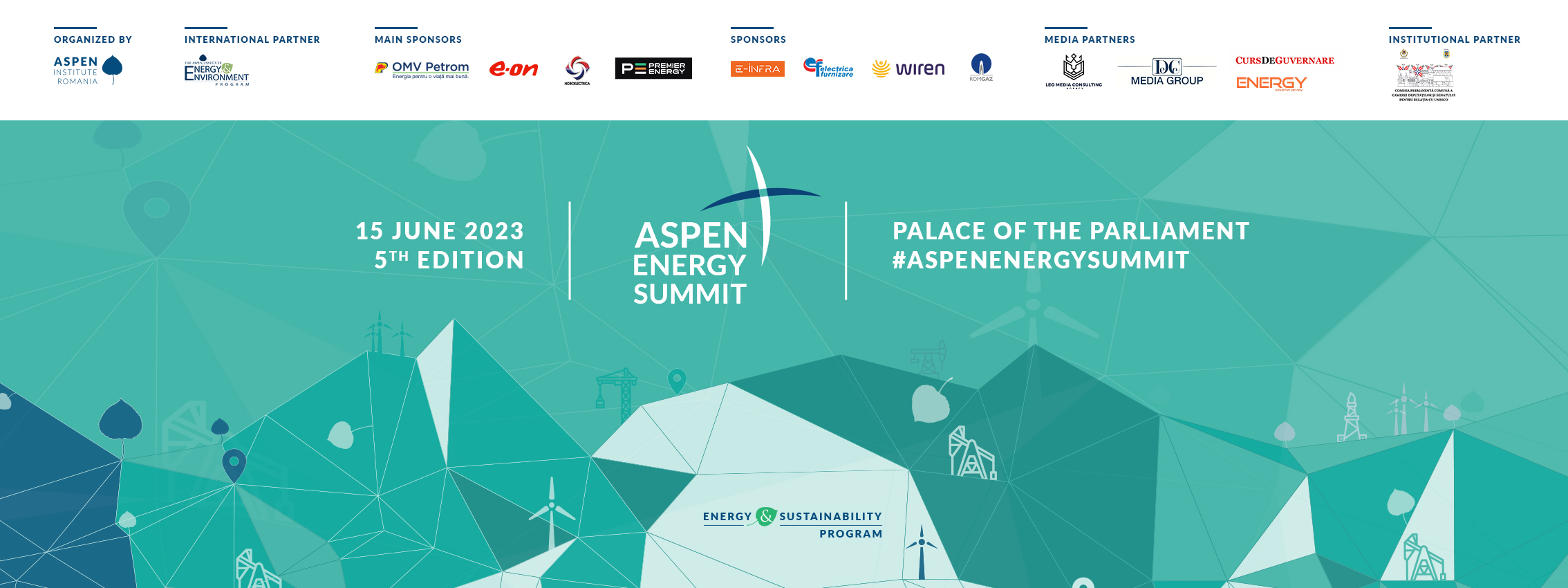Aspen Energy Summit 2023
5th edition
15 June 2023, Bucharest
Organized by: Aspen Institute Romania
International Partner: Aspen Institute Energy and Environment Program
Main Sponsors: OMV Petrom, E.ON, Hidroelectrica, Premier Energy
Sponsors: E-infra, Electrica Furnizare, Wiren, Romgaz
Media Partners: Leo Media Consulting, DC Media Group, CursDeGuvernare, Energy Industry Review
Institutional Partner: The Joint commission of the Chamber of Deputies and the Senate for the relationship with UNESCO, Parliament of Romania
About the Summit
Aspen Energy Summit, organized under the aegis of Aspen Institute Romania’s Energy and Sustainability Program, was created to explore strategic issues at the intersection of energy, economics, technology, geopolitics and security. Since 2017, a select group of international leaders, national decision-makers, public policy experts and representatives of academia gather annually for an open discussion on topics of national and transnational importance. These discussions aim to encourage new collaborations and trans-disciplinary thinking.
The 5th edition of the Aspen Energy Summit will take place in Bucharest, on the 15th of June 2023. The Summit will analyse perspectives for Romania, its region, the EU and transatlantic cooperation, focusing on the following main themes:
- Main economic opportunities related to the Green Transition.
- Geopolitics and energy security in the context of the war in Ukraine.
- Large green energy infrastructure projects: possibilities for investments and means of financing.
- Research and development: towards an innovation-based model in the energy sector, able to fuel the Green Transition.
About the Aspen Energy & Sustainability Program
The Aspen Energy and Sustainability Program is a Aspen Institute Romania’s dialogue platform focused on collaborative ways to promote sustainability in a technology-based energy sector. Based on the Aspen Method, the Program facilitates a transparent, responsible and non-partisan reflection process, between public decision-makers, private stakeholders and representatives of the non-governmental and academic sectors. The Program debates policies in areas such as sustainability in the energy sector, financing the green transition and opportunities for investments, Romania’s implementation of the Green Deal targets and its effect on the Romanian industry, innovation in the energy sector or energy security in a geo-strategic context.
Agenda
09:30-10:00: Participants’ registration & welcome coffee
10:00-10:05: Opening Remarks
- Florin Pogonaru, Vice-president, Aspen Institute Romania (confirmed)
10:05-10:15: Keynote Addresses
- Pamela Ward, Minister Counselor for Commercial Affairs & Regional, Senior Commercial Officer for Southeast Europe, U.S. Department of Commerce (confirmed)
- Costel Neculai Dunava, Chairman, Committee for Economic Policy, Reform, and Privatization (confirmed)
10:15-11:00: Energy in Geopolitics and Geoeconomics – Impact of the war in Ukraine
The war in Ukraine has brought a strong consensus in Europe on the need to decouple from Russian gas – and the EU has taken concrete steps in that direction through the diversification of supply and a renewed push towards green energy. How will energy continue to impact the geopolitics and geoeconomics of the future, how will the energy prices and supply look in the next few months and how will the ongoing war in Ukraine affect existing trends in the energy sector?
- Cristian-Silviu Bușoi, Chair – Committee on Industry, Research and Energy (ITRE), European Parliament (confirmed online)
- Tatiana Iosiper, Special Envoy for Energy and Climate Diplomacy, Ministry of Foreign Affairs of Romania (confirmed)
- Tudor Constantinescu, Principal Adviser, Director General for Energy in the European Commission (confirmed online)
- Răzvan Nicolescu, Member of the Governing Board, European Institute for Innovation and Technology (EIT) (confirmed)
Moderator: Cristian Pîrvulescu, Director, Aspen Energy & Sustainability Program (confirmed)
11:00-11:45: Green Energy Infrastructure & Financing Large Infrastructure Projects
Both the Green Deal and the war in Ukraine provide a strong impetus towards developing large energy infrastructure projects – both across borders and internally. What are the priorities for Europe, the region and Romania and what are the financing opportunities available for projects contributing to the security of energy supply and decarbonization of European economies?
- Joe Philipsz, Head of Three Seas Initiative Investment Fund, Amber Infrastructure Group Ltd (confirmed)
- Alexandru Chiriță, Director General, Electrica (confirmed)
- Bogdan Belciu, Partner & Co-Founder, Valorem Management Consulting(confirmed)
Moderator: Ana-Maria Cătăuță, Member, Committee for Industries and Services, Chamber of Deputies, Romanian Parliament, Aspen Fellow (confirmed)
11:45-12:15: Coffee break
12:15-13:00: Transition Fuels for a Sustainable Economy
Decarbonization is a strategic priority around the world, with the EU aiming to become carbon neutral by 2050. However, a quick transition to a zero-carbon economy is impossible, suggesting a key role for transition fuels, substituting low-carbon fuel for higher content fossil fuels (e.g. coal and oil). What is the role of natural gas and hydrogen in the energy mix of the near future, and what is the future of nuclear power?
- Francesco La Camera, Director-General, International Renewable Energy Agency (IRENA) (pre-recorded video)
- Anna Akhalkatsi, Country Manager for Romania and Hungary, World Bank (confirmed)
- Livia Stan, Director of Public Affairs and EU Funds, E.ON (confirmed)
- Alexandru Maximescu, Vice-president, Regulatory & Corporate Public Affairs, OMV Petrom (confirmed)
Moderator: Robert Lupițu, Editor in Chief, Calea Europeană (confirmed)
13:00-13:45: Energy Security, Supply Chains and EU Strategic Autonomy
The pandemic and the war in Ukraine have made it clear that the EU needs to do more in terms of its energy security and energy independence, and the ongoing energy transition provides a great opportunity for this. How will the EU achieve Strategic Autonomy in the field of energy given the often-diverging views of member states? Also, since the energy transition hinges on clean energy technology supply chains, what measures can the EU take to become a key player in this, in order not to replace dependence on Russian gas with dependence on Chinese green technologies? What is the effect of the American Inflation Reduction Act on EU’s Strategic Autonomy?
- George Sergiu Niculescu, President, Romanian Energy Regulatory Authority (ANRE) (confirmed)
- Marius Lungu, Policy Officer, Recovery and Resilience Task Force, European Commission (confirmed online)
- Dor Marian, Managing Partner, Wiren (confirmed)
Moderator: Corina Murafa, Energy & Climate Policy Expert, Aspen Fellow (confirmed)
13:45-14:15: Coffee break




